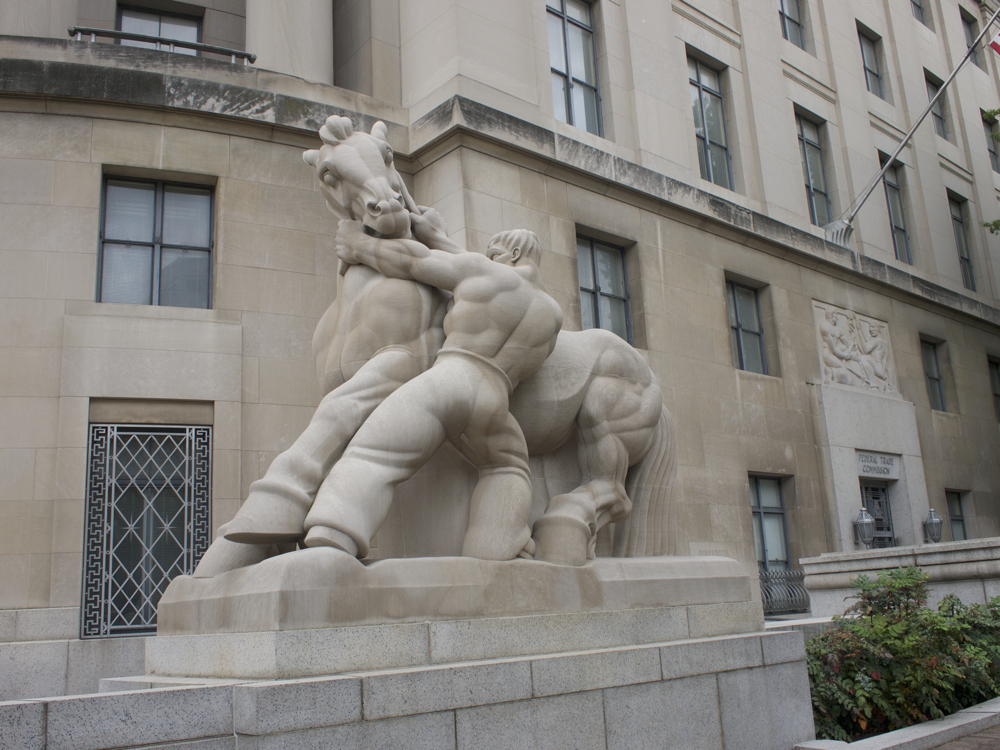Capitalism is not an ism

“Man Controlling Trade”. This Washington, DC statue is how the establishment sees trade: a malevolent peasant forcing a recalcitrant beast to heel.
Capitalism is not a system. Capitalism is the lack of a system to keep people from trading their resources freely. The lack of ability to control other people’s actions is why progressives hate it.
Capitalism is a word made up to hide the fact that what it describes is not a system like other economic isms. Even the simplest and most noble utopianisms of the golden age of utopian idealism required people to set it up and make rules for it. Capitalism is not a system in the sense of something put into place, like socialism. It is just what people naturally do when they get together peacefully.
“You do this for me, and I’ll do this for you.”
That’s capitalism.
It’s don’t hurt people and don’t take their stuff.
Even Marx seems to agree that capitalism is not really an ism:
Free competition brings out the inherent laws of capitalist production, in the shape of external coercive laws having power over every individual capitalist.1
That is, while democratic countries do have “external coercive laws” about capitalism, these laws are not the result of experts controlling individuals, but rather are inherent in the nature of individuals, whenever people are allowed to trade what they have for what they want and are encouraged to do so peacefully.
Capitalism is not about forcing people to trade, it’s about letting them safely trade.
What Marx and other ismists don’t seem to have done is take the logic a step further. If the “laws of capitalism“ are imposed on men by their nature, then attempting to replace capitalism with man-made isms will result in natural catastrophes: black markets, corruption, and violence as nature attempts to move around those artificial boundaries.
In response to The Bureaucracy Event Horizon: Government bureaucracy is the ultimate broken window.
Quoted in The Thomas Sowell Reader•.
↑
- The Thomas Sowell Reader•: Thomas Sowell (hardcover)
- These essays provide short, packed introductions to Sowell’s approach to economics, and his research into other social problems facing the United States and the world today. It’s a great choice for a first book if you haven’t read any of his other books yet; and if you haven’t, you should.
More economics
- The ruling class’s unexpectedly old clothes
- I recently ran across early use of “unexpectedly” for a conservative’s strong economy, referring to the early 1981 market recovery under President Reagan.
- Basic Economics: A Citizen’s Guide to the Economy
- Economics is an important topic, because unlike every other complex field, “from botany to brain surgery”, we cannot avoid taking part: while we can, and usually should, refuse to perform brain surgery, we should not refuse to vote for politicians (and, in some states, initiatives) that have wide-ranging economic effects.
- Definitionally dodging recession responsibility
- You’re in a recession when the economy’s doing well; you’re out of it when the economy sucks. Ignore that mortgage crisis behind the curtain.
More free market
- Reagan’s Lincolnian Revolution
- Reagan provided an alternative to the assumption held by both parties that bureaucracy was superior to individual freedom.
- TXU bets against deregulation and loses
- TXU was once the government-sponsored monopoly energy provider in Texas. They just went bankrupt, apparently because they expected a free market to act like a government market.
- The precarious value of middlemen
- In a world of choice, a middleman must add value (lower prices, ease of delivery) in addition to their added costs (fewer choices, lower quality, etc.) But the costs are always there. Once a middleman is mandated, there is no longer any need to add value.
- Trying the market, or “No, you are.”
- I think I’ve figured it out. When people say they’ve tried the market and found it wanting, they’re really just trying to deflect criticism of government policies. They’re trying to pretend that the problems government causes are someone else’s fault—in this case, the free market.
- Exchanging the market for high prices and corruption
- The Democratic health insurance exchange looks like it’s going to make many of the same mistakes politicians made in California when they tried to choke electrical power through a power exchange.
